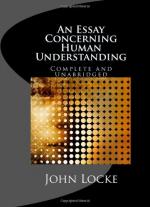
|
| Name: _________________________ | Period: ___________________ |
This test consists of 15 multiple choice questions and 5 short answer questions.
Multiple Choice Questions
1. What quality does Locke say innate principles lack?
(a) Variability.
(b) Translatability.
(c) Universal consent.
(d) Presentability.
2. What does Locke argue against in Chapter 2 of Book I?
(a) The idea of original sin.
(b) The idea of transubstantiation.
(c) The idea of innate knowledge.
(d) The idea of cultural relativism.
3. Where does Locke say ideas come from?
(a) Experience.
(b) Memory.
(c) Collective unconscious.
(d) Senses.
4. What does Locke use as an example of abstraction?
(a) People.
(b) History.
(c) Chairs.
(d) Nature.
5. What does Locke say about the knowledge of how property rules should be established?
(a) It should be scientifically evaluated.
(b) It must be learned.
(c) It must be doubted.
(d) It must be established anew each generation.
6. What does Locke say perception creates?
(a) Language.
(b) Ideas.
(c) Symbols.
(d) Experiences.
7. Where does Locke say ideas come from?
(a) Experience.
(b) Inspiration.
(c) Senses.
(d) God.
8. What does Locke say about the difference between reflection and sensation?
(a) Sensation provides material for reflection.
(b) They are not totally different.
(c) Reflection works first.
(d) They are mutually exclusive.
9. Abstraction is the ability to do what, according to Locke?
(a) Contradict an idea.
(b) See a concept in a sense experience.
(c) Deduce a meaning from a category.
(d) Turn an idea into a representative.
10. What consequence does the fact that knowledge is limited have on our knowledge, according to Locke?
(a) It does not invalidate it.
(b) It obligates people to constant conversation.
(c) It means that man has to devise better tools for experimenting.
(d) It limits the fields in which we can know anything.
11. What qualities does Locke say things have?
(a) Practical and symbolic.
(b) Simple and complex.
(c) Primary and secondary.
(d) Essential and contingent.
12. How does Locke characterize perception?
(a) Self-aware.
(b) Incomplete.
(c) Basic.
(d) Complex.
13. How does Locke use walnuts to illustrate the qualities of things?
(a) Walnuts are seeds for trees but food for animals.
(b) Walnuts look different than grown walnut trees.
(c) Crushed walnuts will look different than whole walnuts.
(d) Walnuts are different at different stages of their development.
14. Where do secondary qualities originate, according to Locke?
(a) Things themselves.
(b) In the universe.
(c) Interactions.
(d) Historical narratives.
15. What is substance, according to Locke?
(a) The history of a thing.
(b) The abstraction of a thing.
(c) Separation between things.
(d) The essence of a thing.
Short Answer Questions
1. How does Locke describe reflection?
2. How does Locke try to look at understanding?
3. What does Locke show about the ideas people claim are innate?
4. What idea does NOT come from sensation, according to Locke?
5. How are primary qualities different from secondary qualities?
|
This section contains 474 words (approx. 2 pages at 300 words per page) |

|




